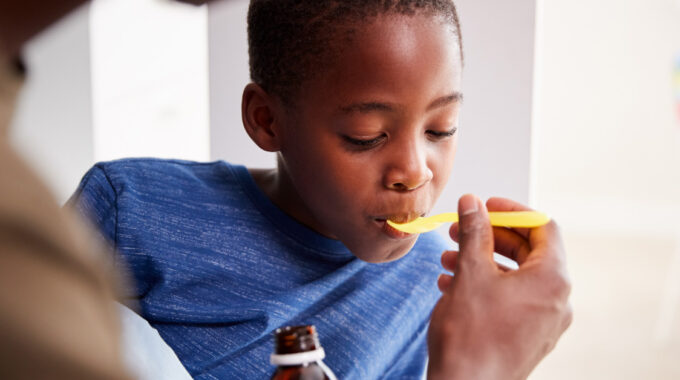
Honey Beats Over-the-Counter Cough Meds
Note: Nothing in this article is relevant to COVID-19. Please follow the advice of your clinician and the Centers for Disease Control. This article refers to older forms of upper respiratory tract infections such as the common cold, rhinovirus, influenza virus, adenovirus, enterovirus, and respiratory syncytial virus, S. pyogenes, and a group A streptococcus. Honey is generally not recommended for children younger than 12 months due to concerns over botulism.6
Are Off-The-Shelf Cough Meds Appropriate for Children?
In 2007, the American Academy of Pediatrics raised concerns about the safety of over-the-counter (OTC) cough medications for children.1 In response, manufacturers began voluntarily labeling these meds as “not for children under four.” However, Health Canada, the Canadian department of public health, recommends against the use of OTC cough suppressants for children below the age of six.2 Among children younger than 12, dosing errors have been connected to these problems:1
- Tachycardia: abnormally rapid heart rate
- Somnolence: excess sleepiness
- Hallucinations
- Ataxia: impaired balance or coordination
- Mydriasis: drug-induced pupil dilation (in this context)
- Agitation
The World Health Organization Endorses Honey for Cough
The World Health Organization endorses honey as a demulcent for children older than 12 months. Authors describe honey as offering antimicrobial, antioxidant, and wound healing properties owing to the interaction of its inhibines such as hydrogen peroxide, flavonoids, and phenolic acids.3,4 Can something as simple as honey replace the efficacy of medications such as dextromethorphan (Children’s Robitussin Cough Long-Acting), levodropropizine (Antux), and diphenhydramine (Benadryl)?
Studies Find that Honey Beats OTC Cough Meds
Dr. Mohamed Toorani recently performed a systematic review of all the controlled trials researching honey for cough. The results were published in the Journal of Pediatric and Neonatal Individualized Medicine.5 Some of the studies had limitations, but Dr. Toorani was able to draw larger conclusions by combining the results of six controlled trials covering a total of 934 patients provided honey. Honey proved highly effective in measures such as cough severity, frequency, and sleep quality. Therapeutic success rates tended to range from 81% to 87%, with honey typically being found more effective than the drugs listed above, saline nose drops, and nebulizers. It was common to deliver doses before bedtime. The included studies did not find a significant difference between therapeutic success rates related to different types of honey.
References
- Green JL, Wang GS, Reynolds KM, Banner W, Bond GR, Kauffman RE, Palmer RB, Paul IM, Dart RC. Safety profile of cough and cold medication use in pediatrics. Pediatrics. 2017 Jun 1;139(6):e20163070.
- Canadians H. Health Canada releases decision on the labeling of cough and cold products for children. 2007-10-11).
- Ajibola A. Novel insights into the health importance of natural honey. The Malaysian Journal of Medical Sciences: MJMS. 2015 Sep;22(5):7.
- Wahdan HA. Causes of the antimicrobial activity of honey. Infection. 1998 Jan 1;26(1):26-31.
- Toorani MQ. The therapeutic role of honey for treating acute cough in the pediatric population. A systematic review. Journal of Pediatric and Neonatal Individualized Medicine (JPNIM). 2019 Jul 20;8(2):e080205.
- Cox N, Hinkle R. Infant botulism. American Family Physician. 2002 Apr;65(7):1388-92.






